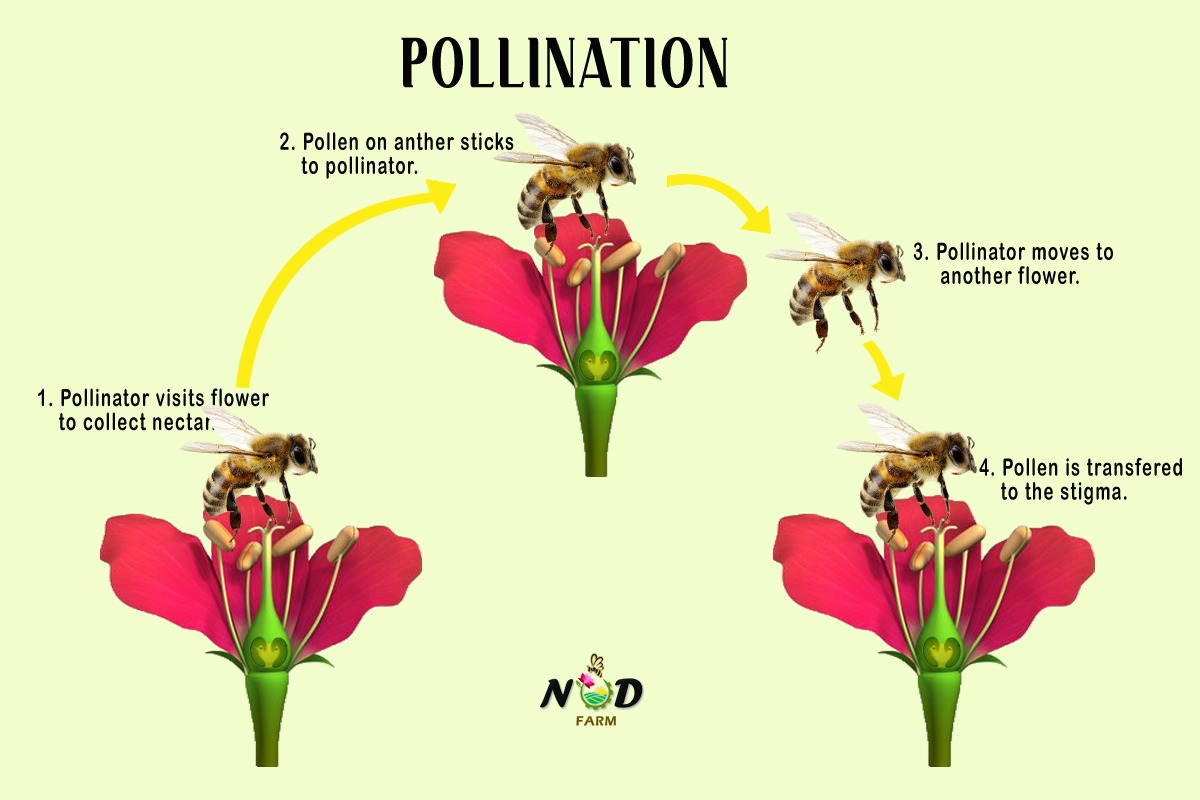POLLINATORS
Definition:
- *A pollinator can be defined as an agent that carries pollen from the male part of the flower (stamen) to the female part of the same flower or another flower (stigma).
- * Pollen development should happen for the plant to prepare and produce natural products, seeds, and young plants. A few plants are self-pollinating, while others might be prepared by pollen conveyed by wind or water. In any case, different blossoms are pollinated by insects and animals - like honey bees, wasps, moths, butterflies, birds, flies and little warm-blooded animals, including bats.
- * Insects and different creatures like bats, insects, and flies visit blossoms looking for food, cover, home structure materials, and here and there even mates. A few pollinators, including numerous honey bee species, purposefully gather pollen. Others, like numerous butterflies, birds and bats, move pollen unintentionally. Pollen sticks on their bodies while drinking or benefiting from nectar in the blossom sprouts and is moved knowingly from one flower to another subsequent in pollination.

The Straightforward Truth: We Can't Survive Without Them!
Pollination isn't simply a fascinating characteristic of history. It is actual environmental endurance work. Without pollinators, humanity and the entirety of earth's earthbound environments would not endure. Of the 1,400 yield plants developed throughout the planet, i.e., those that produce the entirety of our food and plant-based mechanical items, practically 80% require pollination by insects. Visits from honey bees and different pollinators likewise bring about bigger, more delightful products of the soil crop yields. In the US alone, pollination of rural yields is esteemed at 10 billion dollars yearly. Around the world, pollination administrations are likely worth more than 3 trillion dollars.
Are Pollinators give Benefit?
The First and Foremost point is Eating:
One out of each three chomps of food you eat exists due to the endeavors of pollinators, including numerous natural products, vegetables, and seeds. Pollinators not exclusively are important for our food; however, they support the food and territory of creatures.
Clean Air:
Sound biological systems rely upon pollinators. In any event, 75% of the multitude of flowering plants on earth are pollinated by bugs and creatures! This adds up to 1,200 food crops and 180,000 distinct kinds of plants—plants that help balance out our soils, clean our air, supply oxygen, and backing natural life.
Healthy Economy:
In the US alone, pollination by bees added to more than $19 billion of harvest creation in 2010, during pollination by other creepy-crawly pollinators to $10 Billion of crop productivity.
Tips for Building up a Sound Natural Environment for Pollinator:
- *Start right. Flowering plants can be begun from seed; bushes are better settled by relocating seedlings.
- * Think about the soil attributes, site seepage, daylight, and different components when choosing plants.
- * Give an assortment of flower tones and shapes to draw in various pollinators.
- * Plant in bunches, instead of single plants, to all the more likely draw in pollinators.
- * Pick plants that blossom at various seasons to give nectar and dust sources all through the developing season.
- * At whatever point conceivable, pick local plants. These plants will be better adjusted to your dirt kind, environment, precipitation, and nearby pollinators.
- * Keep away from the utilization of pesticides. Practice Integrated Pest Management (IPM) to diminish harm to your plants and ensure pollinators by utilizing fewer synthetic compounds.
- * Visit a plant nursery to get some information about pollinator plants appropriate for your site conditions.
- * Pollinator needs water as well. You can give water for pollinators a shallow dish, bowl, or water basin with half-lowered stones for roosts.
Social Significance of Pollination:
Local People groups customarily perceived the significance of pollinators:
- *Social imagery
- * Food plants
- * Medicinal plants
- * Plant-based colours
Policies for Pollinators:
- *Great stewardship rehearses by the yield assurance industry, ranchers, and beekeepers are important for ensuring the strength of pollinators.
- * The yield assurance industry is focused on instructing farmers on stewardship best practices to restrict any dangers to pollinators.
- * The yield business depends on our pollinators and needs to keep them protected and solid.
- * Farmers can improve natural pollinator surroundings by planting bloom borders around crop regions.
- * Beekeepers should be cautious in observing for sickness and mite levels in a settlement.
- * Responsibilities. Satisfy guarantees made broadly and universally to ensure biodiversity including:
- * Acquainting measures secure natural life and advance green spaces and natural life hallways to stop environments and reestablish biodiversity.
- * Guarantees made as a signatory of the Show on Organic Variety, particularly meeting 2020, focuses on switching the decrease of nature.
- * Getting POLLINATORS: Execute research and connect information holes in pollinator misfortunes, environment and dissemination while finding ways to improve the strength of oversaw honey bees.
- * Cultivating FOR POLLINATORS: Boost the far-reaching board of farming area for pollinators, including naturally oversaw farmland and the advancement of scene wide environment organizations.
- * AGROCHEMICALS: Guarantee that the current prohibition on three neonicotinoids on crops alluring to pollinators is made perpetual and completely carried out. Furthermore, broaden the restriction on these neonicotinoids to use on any remaining harvests considering proof of pollution to wildflowers and openness to other untamed life.